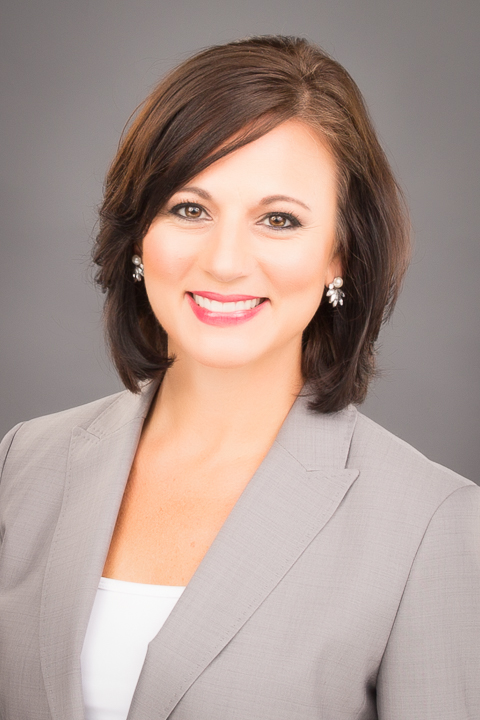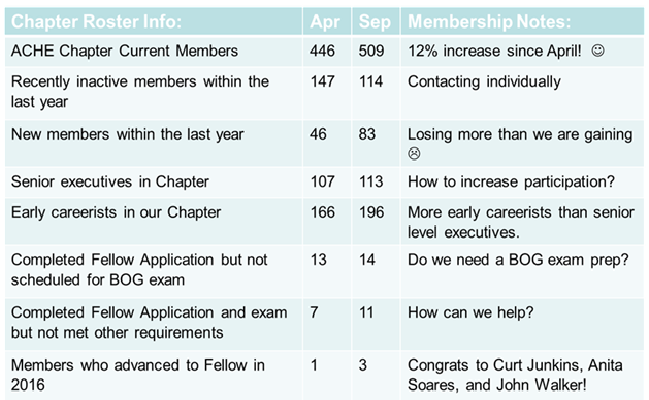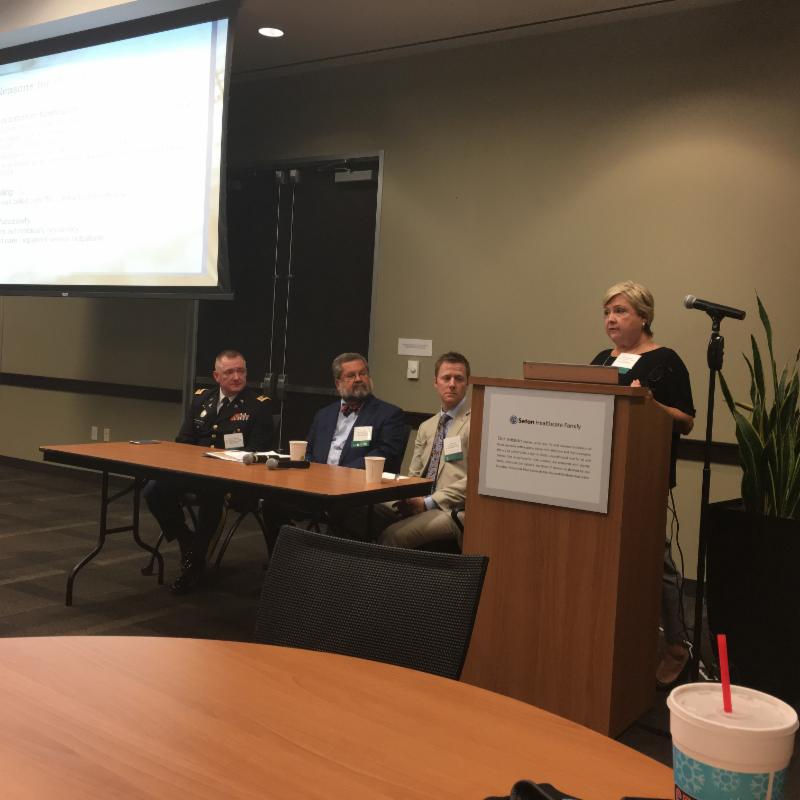 |
|
|
|
2016 ACHE Fall Collaborative
Friday, Nov. 4, 2016
1:00 - 7:30 PM
Texas State University
McCoy College of Business
601 University Dr.
San Marcos, TX 78666
|
2016 Central Texas
Board of Directors
|
Michael Nowicki, EdD,
FACHE, FHFMA
Regent
Amanda Frye, MHA
President
Eric Weaver, MHA, FACHE
President Elect
David Perez, MBA
Secretary/Treasurer
Beth Booher, MHA, FACHE
Director of Membership
Maria Serafine, MHA
Director of Program Development
Richard Sanchez, MHA
Director of Communications
Jeff Blackwell, FACHE, MAJ, MS
Director of Local Program Council
Amanda Estrada, MHA, FACHE
Director of Networking & Social Events
|
|
Members who recently passed the Board of Governors Exam
July
Esther Y. Chung, Austin
Jennifer Dawson, Austin
Luis C. Rodriguez Jr., Austin
New Members
July
Dan Brueckman, Austin
Kortney Darapheth, Austin
Jenny Ozuna, San Marcos
Noel A. Peterson, Cedar Park
Joseph Rogan, Round Rock
Sarah A. Rusk, Austin
Heather Spillman, Austin
August
Christian Catron, Austin
Becky Day, Austin
Sina Haeri, MD, West Lake Hills
Lauren Hicks, Austin
Katie Lattanzi, Austin
Juan S. Morales Jr., RN, Austin
Chadwick Sapenter, Austin
Steve Whitehurst, Belton
September
Jon L. Belsher, MD, Austin
Raymond Josef Harrison, MD, Copperas Cove
Douglas Kuhlman, San Antonio
Ashley Short, austin
Recertified Fellows
August
COL John D. Belew, FACHE, Fort Hood
Tucker Bonner, FACHE, Austin
Jenifer Greenway, FACHE, Austin
September
Deborah J. Weems, FACHE, Burnet
|
September is the perfect time to share the value of membership with your colleagues - Plus earn great rewards!
|
September is the ideal time to promote ACHE membership to your nonmember colleagues. When they join in September, their first-year's dues of $150 will cover the rest of 2016 and all of 2017-that means they receive 16 months of membership benefits for the price of 12. Nonmembers can join online at ache.org/join, and they will have access to the same resources you rely on to connect, succeed, learn, advance and lead.
|
ACHE On-Location Programs Offer Customized Education On-Site
|
ACHE's On-Location Programs are customized ACHE seminars that can be brought directly to your organization. ACHE will help coordinate faculty and produce materials; your team will conveniently earn ACHE Face-to-Face Education credits.
On-Location Programs cover a range of topics, including:
- Career Development
- Community health and involvement
- Customer satisfaction
- Diversity
- Facility design and construction
- Financial management
- General management and administration
- Human resources and workforce issues
- Law
- Leadership
- Marketing and strategic planning
- Medical staff relationships
- Public policy
Depending on the length of the program, seminars are assigned 3, 6, or 12 ACHE Face-to-Face Education credits toward advancement or recertification in ACHE.
ACHE will work with organizations to build a program that suits their needs. For more information, contact Catie L. Russo, program specialist, Division of Professional Development, at crusso@ache.org or (312) 424-9362.
|
Are you due to recertify your FACHE credential in 2016?
|
Demonstrate your continued dedication and commitment to lifelong learning by recertifying your FACHE® credential.
Visit
my.ache.org
(login required) to learn when you are due to recertify. If you are required to recertify in 2016, you will see a link to your personalized online recertification application. Please submit this application no later than Dec. 31; include your Qualified Education credits and your community/civic and healthcare activities.
For more information, please visit
ache.org/Recertify
. You may also contact the ACHE Customer Service Center at (312) 424-9400 Monday-Friday 8 a.m.-5 p.m. Central time or email
contact@ache.org
.
|
Save time and money with ACHE self-study program
|
Need to earn ACHE Qualified Education credits? Earn six hours by completing a course through ACHE's Self-Study Program. Self-Study courses are portable and ready for you anytime-at home, in the office, and more. Topics include finance, human resources, leadership and management. Take advantage of ACHE's special offer: purchase one self-study course and receive a second course at 50 percent off. To review a list of available courses and corresponding Health Administration Press books and to place an order, visit
the ACHE website.
|
Offering a Postgraduate Fellowship? ACHE can help
|
ACHE would like to know if your organization is offering a postgraduate fellowship for the upcoming year. If so, we encourage you to add it to our complementary Directory of Postgraduate Administrative Fellowships at
ache.org/Postgrad
.
As a healthcare leader, you know how crucial it is to attract and develop highly qualified professionals in your organization. Gain exposure and start attracting top-notch applicants by posting your organization's program on ACHE's Directory. You may add a new listing or update a previous one at any time by completing the
Online Listing Form
.
Questions?
Please contact Liz Catalano, membership coordinator at (312) 424-9374 or email
ecatalano@ache.org
|
|
|
Central Texas ACHE Job Bank
|
|
| |
If you would like to post a job opportunity, please contact
Richard Sanchez.
|
|
 |
|
 |
|
A message from your ACHE Regent
Michael Nowicki, EdD, FACHE, FHFMA
Fall is in the air with promises of cooler temperatures and football. For some it means back to school. For those of you not in school, remember the sense of accomplishment you had by doing well on an exam? You can capture that sense of accomplishment again by passing the Board of Governors Exam-board certified in healthcare management and a Fellow in ACHE. It may be easier than you thought. In order to submit a Fellow application, you must meet the following requirements... Click Here to Read More.
|
|
Amanda Frye, MHA

Greetings Central Texas Chapter!
It is difficult to believe October is upon us! The year is truly flying by and although we are not quite to the end of it, I wanted to take this opportunity to provide a detailed update and recap of our year so far.
Recently, I was able to see the results of our annual chapter member survey. I will be sharing those at a future meeting. Some results I want to share now are the top drivers of members attending chapter events:
- The top two by far were convenient location and opportunity for ACHE face-to-face credit hours.
- The next level of drivers included opportunity for other educational credits, interesting topics and affordability.
I hope our membership would agree the events we offer address these key drivers of attendance and add value to the membership experience.
Click here to read more!
|
|
Beth Booher, MHA, FACHE
Dear Members of the Central Texas ACHE:
It is hereby proclaimed that October is Beth's nominated "Membership Update Awareness Month!"
I am asking, no - begging, everyone to please log into ACHE.org and review your profile. I know we have folks that get promoted, retire, or transfer to another job and your title and email address change. We currently have 520 member and over 30 of them don't have email addresses listed. Now, I know none of us want to be bombarded with SPAM mail but this is one of the main ways we communicate with our members. I appreciate everyone who keeps their contact info up to date. THANK YOU!
If you didn't know, our Chapter has a 5 year Strategic Plan and annual goals as a part of our Chapter Governance. One of our goals is to increase our members by 3.5% by January 1, 2017. Our 2016 objective is to add 91 members and we have only added 81 so far. We only have 10 to go!!! Don't you want to see a happy Membership Chair? HELP ME PLEASE! (Have you noticed my trend of begging and pleading?) OK, but seriously folks... we provide a great service and an exceptional price. So... for the next Chapter events please consider bringing a colleague. Once they know how fun we are and how ACHE can help them in their career they will sign up!

|
|
|
CTACHE Education Programs
|
|
|
Care Coordination & Telemedicine Strategies in Healthcare
On Thursday, July 28th, the American College of Healthcare Executives (ACHE) and the National Forum for Latino Executives (NFLHE) hosted the continuing education event, "Care Coordination and Telemedicine Strategies". A panel discussion featuring Kristi Henderson, NP, VP Virtual Care & Innovation, Seton Healthcare Family, Emily Padula, RN, Chief Strategy Officer, Hill Country Memorial and Mark Hernandez, MD, Chief Medical Officer, Community Care Collaborative (CCC) was moderated by Denise Esper, CEO, Procentric.
Kicking off the discussion, Denise asked the panelists to outline how the Accountable Care Act (ACA) has impacted their service delivery. Dr. Hernandez pointed out that the CCC is not beholden to ACA; however, they must coordinate with payers and providers for better outcomes. According to Emily, the Accountable Care Act has driven consolidation within their small and rural market, allowing them to work with physicians in new ways. Lastly, Kristi mentioned that ACA has been a catalyst for telemedicine to improve access and lower costs.
Click here to read more!
|
|
Financial Implications: the Push from Inpatient to Outpatient Care

On Thursday, August 25th, the American College of Healthcare Executives (ACHE) and the Healthcare Financial Management Association (HFMA) hosted the continuing education event, "Financial Implications: The Push from Inpatient to Outpatient Care". A panel discussion featuring David Shimp, FACHE, COO, St. David's Medical Center, Rebecca Posey, RN, Division Director for Denial Prevention, St. David's Healthcare and Jeffrey Blackwell, FACHE, Chief, Business Operations Division, US Army/Carl R. Darnall Army Medical Center, was moderated by Andrew Lasser, DrPH, FACHE, EVP, Avanza Healthcare Strategies.
Kicking off the discussion, David discussed the macro and financial impacts, as well as, the future state for increasing focus on outpatient service delivery. Macro impacts include the need to accurately define total cost of care, consumerization adoption, hospital acquired infections and efficiency of care. Financial impacts were defined as joint venture ambulatory surgery centers, service line development, physician practice acquisition/development, facility expansion and intensity of care within the inpatient setting. Advancing care delivery will occur with outpatient total joint replacement, ICU growth and continued service delivery transformation.
Click here to read more!
|
|
Millennials Role in Healthcare
Nini Perry, MBA, RN, CPHQ
CEO, NexGen Strategic Consulting
According to Pew, the Millennial Generation (aged 18 to 34) are now the largest segment of the workforce surpassing Generation X. Noteworthy, the impact of the Millennials within the workforce especially as it relates to healthcare cannot be ignored. In the context of nursing and healthcare, nursing shortages and skill gaps are concerning. The Bureau of Labor and Statistics projects a 16% growth of Registered Nurses from 2014 (2,751,000) - 2024 (3,190,300). However, the demand exceeds the supply in our nation's healthcare. Contributing factors to the demands are the increasing number of individuals having access to healthcare due to healthcare reform and the need to replace workers who will retire over the coming decade. Nursing graduates will need to replace their retiring cohorts in hospitals. Nursing recruitment and retention is essential Click here to read more!
|
7 Common Consulting Mistakes Your Physician Clients Want You To Avoid
Deborah C. Munhoz
Executive Coach for MDs, Pure Success Coaching
Consultants need to know how best to work with their physician partners for change in healthcare. Taking the steps to gain the trust and engagement of physicians is an investment in great outcomes. Resistance, lack of engagement, and missed deadlines are what consultants can expect if they don't consider the needs and mindset of physicians during a change process. The benefit to you and your clients when you do is greater ease, more fun and creating timely change.
The mistakes to avoid when working with physicians are so common that even experienced consultants make them. Avoiding these mistakes is most relevant when consultants are expected to provide expertise and solutions. By following these strategies, consultants can help themselves and their physician clients to be successful.
Click here to read more!
|
The Psychology of Success: Leadership Lessons From an Olympic Swimmer
What could Olympic medalist Katie Ledecky, who holds five gold medals in swimming and shattered the world record in the 800-meter freestyle at the 2016 Olympics, teach healthcare leaders about leadership? Four lessons stand out.
Do the work. Ledecky's day starts at 4:05 a.m. with a breakfast of two slices of toast with peanut butter and a banana or apple before swimming from 5-6:30 a.m. and again from 3:30-6 p.m., not counting one hour of dry-land training three days a week. She's spent thousands of hours spent honing her skills-and she's 19. More than that: She wants to do the work required to succeed on a global level.
Skip the back-up plan. When your primary goal is the only goal in sight, you'll work harder to achieve it.
Don't follow the crowd. Ledecky trains at near-race pace every day, twice a day, with a stroke rate that is significantly higher than the rate of most swimmers.
Set big goals. Ledecky doesn't just want to win each race. She wants to set world records-and she has, multiple times.
Never stop setting goals. After Ledecky first broke the world record in 800-meter freestyle, she and her coach set a goal to do it again, this time with a winning time under 8 minutes, 5 seconds. Ledecky's winning time in the 2016 Olympics: 8 minutes, 4.79 seconds.
-Adapted from "6 Ways Katie Ledecky Thinks Differently: The Psychology of Success," inc.com, Aug. 11, 2016.
|
|
5 Things Productive People Do Differently
How do some of the world's greatest talents manage their time? Forbes gleaned these tips from several masters of the art of business.
They don't use to-do lists. Instead, highly productive people schedule tasks on their calendar-and they stick to that calendar down to the minute.
They carry a notebook. Richard Branson of Virgin fame doesn't go anywhere without a notebook, and neither did Greek shipping magnate Aristotle Onassis. Carrying a notebook enables you to write down that million-dollar idea whenever the idea presents itself-and before you have a chance to forget.
They focus on minutes, not hours. As Olympic gymnast Shannon Miller once told Forbes author Kevin Kruse, "To this day, I keep a schedule that is almost minute by minute." Successful people know the value of their time and hold themselves accountable for time spent.
They concentrate on just one thing at a time. Highly successful people like Tom Ziglar, CEO of Ziglar Inc., invest the first hour or two of their day working on their No. 1 business priority.
They make it home for dinner. Highly successful people know there will always be reasons to stay longer at work, but they make time for the things they value outside of work, too, from family to friends to exercise to favorite hobbies.
-Adapted from "15 Surprising Things Productive People Do Differently" by Kevin Kruse, Forbes.com, Jan. 20, 2016.
|
Gain Strategies for Achieving Health Equity During Fund Program
Addressing disparities in care and improving health equity requires leadership, vision, teamwork and an understanding of the problem and its potential solutions. ACHE's Fund for Innovation in Healthcare Leadership will host a special program this November that will explore proven tactics for advancing healthcare equity.
"Achieving Care Equity: The Ethical Imperative" will be held Fri., Nov. 11, in Atlanta following ACHE's Atlanta Cluster. This half-day seminar will provide proven strategies for building a sustainable and meaningful equity-of-care strategy based on data that reflects the community and marketplace. Senior leaders of progressive organizations will share their journey toward eliminating racial and ethnic healthcare disparities and achieving care equity.
During this seminar, participants will:
- Identify the challenges posed by personal bias and assumptions
- Examine a community-based approach to health equity that aligns healthcare organizations, payers and community entities
- Understand leaders' roles in ensuring the provision of culturally sound care and making cultural competency an organizational priority
|
|
ACHE Offers Tuition Waiver Assistance for Education Programs
To increase the availability of ACHE educational programming for Members experiencing economic hardship, ACHE has established the Tuition Waiver Assistance Program.
ACHE makes available a limited number of tuition waivers to Members and Fellows whose organizations lack the resources to fund their tuition for education programs. Those in career transition also are encouraged to apply. Tuition waivers are based on financial need and are available for the following ACHE education programs:
- Congress on Healthcare Leadership
- Cluster Seminars
- Self-Study Programs
- Online Education Programs
- Online Tutorial (Board of Governors Exam preparation)
- ACHE Board of Governors Exam Review Course
All requests are due at least eight weeks before the program date, except for ACHE self-study courses; see quarterly application deadlines on the FAQ page of the tuition waiver application for complete information. Incomplete applications and those received after the deadline will not be considered. Recipients will be notified of the waiver review panel's decision at least six weeks before the program date. For ACHE self-study courses, applicants will be notified three weeks after the quarterly application deadline.
If you have questions about the program, please contact Teri Somrak, associate director, Division of Professional Development, at (312) 424-9354 or
tsomrak@ache.org
. For more information, visit
ache.org/Tuitionwaiver
.
|
|
|
 |